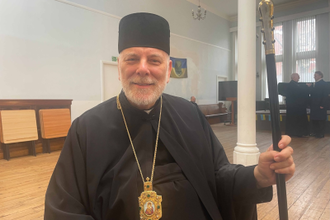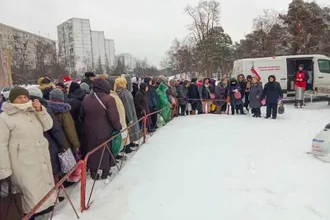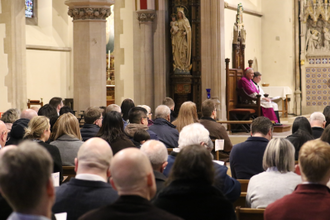"How might we begin a 'rational dialogue' about the war in Ukraine?"

Philip McDonagh
Irish diplomat Philip McDonagh spoke at the annual national conference of the National Justice and Peace Network of England and Wales on 22 July 2022 on the theme: 'Towards a Civilisation of Hope. The following is his longer, written response to the question from the audience: "How might we begin a "rational dialogue" about the war in Ukraine?"
This is a crucial question. There are some who would say that it should not be answered. From their perspective, our first obligation is to distinguish between perpetrator and victim and to align ourselves with the victim. To this I would reply that there are many different actors in a situation like this and many forces in play. A rational dialogue is the opposite of a sundering of all relationships. It is the opposite of a loss of perspective. At a conference dedicated to Christian hope, we should not be afraid to go in search of elements of common ground, even in the midst of conflict.
That said, I speak tentatively here, in full awareness that some will disagree. I appreciate that the sheer destructiveness of this war makes it hard to speak about dialogue. Moreover, a dialogue ultimately requires the engagement of the main parties concerned. Nevertheless, the question that has been asked cannot, in my opinion, be avoided. If our hope is for a ceasefire, negotiations, and future reconciliation, we must look for the possible starting points of a rational dialogue.
That, I think, is the sense of the Holy See's diplomacy. I recall also Pope Francis's reflections in his address to the Council of Europe a few years ago:
"If [conflict] paralyses us, we lose perspective, our horizons shrink, and we grasp only a part of reality. When we fail to move forward in a situation of conflict, we lose our sense of the profound unity of reality, we halt history, and we become enmeshed in useless disputes."
Against this background, allow me to offer a number of ideas that could illuminate a "rational dialogue" about the war in Ukraine. I begin with one centrally important fact. This week, under the auspices of the UN, Russia and Ukraine signed an agreement on the export of grain. The European Union and others appear to have confirmed at the same time that they are not blocking Russian agricultural exports.
Constructive relationships in the midst of conflict
From this fact we can derive two important ideas. First, constructive relationships rarely wholly vanish even in the midst of a crisis. Apart from the agreement on food exports, we can note that humanitarian corridors have been opened in the present war, though not to a sufficient extent. Prisoners have been exchanged. It is broadly agreed that nuclear installations should be protected. Some categories of weapon have not been used. Why should we not use the channels of communication that exist to develop further confidence-building measures and to "image" future negotiations?
Global responsibilities
The second idea that we can derive from this week's agreement is that irrespective of their aims in the present war, Russia, Ukraine, NATO, the European Union, the United States and all other parties have responsibilities towards the rest of the world. In deciding whether to develop channels of communication or on the other hand, to prepare public opinion for continuing conflict, we cannot ignore the harm that is being done to third parties and to prospects for effective cooperation on global challenges. In 2015, Pope Francis stated in his encyclical Laudato Si': "We can see signs that things are now reaching a breaking point ... the present world system is certainly unsustainable from a number of points of view ... Doomsday predictions can no longer be met with irony or disdain..." (Laudato Si', 2015). The UN Secretary-General, in his document Our Common Agenda (September 2021), suggests that "humanity faces a stark and urgent choice: breakdown or breakthrough." Pope Francis's warning about doomsday scenarios came before the pandemic, the war, and recent signs of a global food crisis. The risk of "breakdown" is growing greater all the time. The ancient Greeks knew that polarisation is the prelude to social disintegration. We should be alert to the many emerging signs of a "clash of civilisations" at the global level.
Helsinki principles: paradigms of security
One way to promote a rational dialogue in the present situation is to look on the present breakdown in relationships in the appropriate historical perspective. In the 1970s, it proved possible to negotiate the Helsinki Final Act as the alternative to a formal treaty ending World War II in Europe. As participating States in the Conference on Security and Cooperation in Europe, we committed ourselves to "cooperating in the interest of mankind." The ten Helsinki principles were intended to shape the ethos of inter-state relations. Separate detailed commitments set out a regional work program corresponding to the main work streams at the UN. A CSCE-style "security community" or "comprehensive approach to security" based on dialogue across a broad agenda and the development of a habit of trust is not the same as a paradigm of regional security based on deterrence, such as we now have. It can be recalled that in the Helsinki Final Act we committed ourselves to taking "measurable steps" towards disarmament - a commitment that has been abandoned as the CSCE, the Conference on Security and Cooperation in Europe, has given way to the OSCE, or Organisation for Security and Cooperation in Europe. Finding a new balance between differing paradigms of security is an essential project in every region of the world and will necessitate generous confidence-building measures on all sides.
Helsinki principles: territorial integrity of states
In 1991, the principle of the territorial integrity of states (Principle IV, Helsinki Final Act) was set aside when western countries, invoking the equal rights of peoples and their right to self-determination (Principle VIII), recognised all parts of the Soviet and Yugoslav federations as independent states. Major change was going to be unavoidable at some point in these geographies, as elsewhere in Europe. However, in the actual circumstances of 1991, there were potential sources of future conflict and obvious areas of interdependence among the new states that ought to have been acknowledged and addressed. Therefore, a further entry point to a rational dialogue in our present circumstances is this: we might ask ourselves what compromises might have been found at the time had the principle of the peaceful settlement of disputes (Principle V, Helsinki Final Act) been brought into play. It cannot be dismissed as completely irrelevant that in 1990, verbal assurances were given to Moscow by Germany and the United States that NATO would not expand beyond the borders of Germany.
Helsinki principles: economic cooperation
A further idea that can help us to find common ground for a rational discussion is to remember that Principle IX of the Helsinki Final Act obliges participating States to develop their cooperation "in all fields … to improve the wellbeing of peoples," taking into account "the interest of all in the narrowing of differences in the levels of economic development." Despite this foundational principle, which brings the European and global agendas together, there has been an influential view among western countries that we should develop economic cooperation in the OSCE only in certain narrow areas in which the OSCE has "comparative advantage." The economic dimension of the OSCE has become a minnow beside the whale of European integration and other Leviathans such as "global Britain."
The Minsk Agreements
This economic argument brings me to another starting point for a rational dialogue, namely the Minsk Agreements of 2014 and 2015. It is worthwhile for anyone interested in dialogue about our current predicament to study the sequence of events in Ukraine in 2014, including the de facto war of that summer, and the balances implicit in the Minsk Agreements. Part of the significance of these agreements is economic. In the preceding years, there was a discussion within the European Union of emerging risks in our relationships with Moscow and Kyiv. One question at issue was whether to present Ukraine with a binary choice between NATO and the European Union on the one hand and relations with Moscow on the other. Had we given ourselves more time in 2013 to work out a nuanced approach - or alternatively, had the Minsk agreements become operative in subsequent years - much of the traditional interchange between Eastern Ukraine and Russia would still be taking place with the approval of all sides. A stark "zero sum game" might have been avoided - or that at least is a hypothesis deserving of a rational discussion.
There is a tendency on the western side to attribute the Russian stance on Minsk to the pursuit of a post-Soviet "sphere of influence," to fear of democracy, or even to some theological vision. No doubt some of these disturbing factors are in play, especially in a situation of spiralling mistrust. Russia would not be the only society in which political uncertainty brings raw feeling to the surface. However, Russia's deepest political motivations and priorities can be framed differently and possibly would be framed differently in the favourable context of dialogue. Russia and Ukraine have connections, including family connections, that go back hundreds of years. Russia can rightly aspire to a reconciled relationship with its nearest neighbour much as the member States of the European Union aspire to reconciled relationships among themselves. The Eurasian Economic Union, a project of the middle of last decade, attempted, for all its weaknesses, to give expression to an EU-style vision for parts of the post-Soviet space.
The Northern Ireland peace process: security guarantees
In the century since the Anglo-Irish Treaty, Ireland has been careful not to pose a military threat to Britain. Our then Foreign Minister drew attention to this commitment in the UN Security Council during the Cuban missile crisis. Since 2014, Ukraine has been urged on by its main western advisors in quite a different direction. The military assurances that can appropriately be given by near neighbours to one another could be another topic for a rational discussion.
The Northern Ireland peace process: preserving what we have in common
Irish governments have been glad to preserve the common travel area across our two islands along with many other special arrangements in spheres such as voting rights and access to healthcare. As long as both Ireland and Britain were Member States of the European Union, we used the wider European rapprochement to relativise the differences among ourselves. In areas such as intermarriage, sport, literature, and the media we have protected what is good in Anglo-Irish relations without this being cast as a betrayal.
The Northern Ireland peace process: the territorial question
Every Irish government has been prepared to leave open for the future the question of re-unifying territory. Not everything needs to be settled here and now. One might go further, and put forward, as a topic for dialogue, the thesis that living with imperfection for the sake of peace is a form of Christian witness.
The Northern Ireland peace process: identity and pluralism
The British and Irish governments have encouraged innovative forms of political and cultural pluralism in Northern Ireland - pluralism, for example, in the sphere of language policy, such as seems to have disappeared from the radar in Ukrainian - Russian relations.
My suggestion, then, is to borrow some ideas from our Irish experience to support Ukraine in its relations with Russia while at the same time moving towards a situation in which the European Union's relations with Ukraine and Russia are less of a zero-sum game as seen from Moscow. Perhaps the most important lesson of all from the Northern Ireland situation is that it is never the wrong time to start working for peace, even with those who are involved in illegitimate violence.
Economic sanctions
I have touched so far on ideas derived from the Helsinki Final Act, the Minsk Agreements, and the Northern Ireland peace process. Before concluding, I will offer two further, tentative ideas on which I stand open to be corrected.
I believe there is scope for a rational discussion, breaking new ground, on the wholehearted embrace of economic sanctions as part of the so-called diplomatic "toolbox". A recent writer describes the emergence of this "tool" a century ago (Mulder, N. 2022. The Economic Weapon/The Rise of Sanctions as a Tool of Modern War, pp. 5-7).
Britain and other western powers actively explored the use of starvation as a weapon in 1918 and 1919 in the hope of reversing the Russian revolution. The naval blockade of Petrograd was based on this premise. A generation later, Germany, with several allies among European governments of the time, pursued a genocidal war in Russia - this within the lifetime of many people who are still living. The orders which guided the siege of Leningrad allowed for the possibility that the entire population would die of starvation. Among those who did die was President Putin's elder brother. My question is this: against the background of 20th century history, what chord is struck in Russia, in the hearts of Russian people, when British or other western politicians speak of degrading Russia for generations to come through the deployment of the so-called economic weapon?
Principle II of the Helsinki Final Act requires participating States to "refrain from any acts constituting a threat of force or direct or indirect use of force against another participating State …" Arguably, the jurisprudence of economic and financial sanctions can benefit from a "rational dialogue," beginning with case studies on Iraq in the 1990s and the current famine in Afghanistan.
Uncovering the sources of creation
I spoke in my presentation about Pope Benedict's conception of "uncovering the sources of creation." If I were British, and in search of a rational dialogue with Russia, I would remember Murmansk and the Arctic convoys.
In 1995, when I was posted in London, we and all our neighbours had a party in Victoria Square to celebrate the 50th anniversary of the end of the war. "Digging for victory" had meant the cultivation of the garden of the Goring Hotel, which we overlooked from our terrace. There was a fly-past of Spitfires. Buckingham Palace was visible across the road. Our neighbour Lady Guinevere asked me whether it was all right to wear two sets of medals, the medals of her husband who died in the war and the medals of her late second husband, who also fought. I, the representative of the Irish Embassy, said, "Of course, yes." Somebody gave us the torn banner of an Irish regiment, I think the Royal Munster Fusiliers, to fly from our upstairs window. In the middle of the street party, the vicar said to me in a low voice, "Of course, it was the Russians won the war."
If I were the Prime Minister, I would never forget that on the best estimate, 27 million citizens of the Soviet Union gave their lives for the allies to win the war. The Queen has shaken hands with Martin McGuinness. I have this funny dream that we can inspire, as well as a common peace in Europe, a new episode of 'The Crown"' if conditions can be created for the Queen to travel to Murmansk or St Petersburg to shake hands with the President of the Russian Federation.
All talks and question/answer sessions from NJPN Conference 2022, 'Hope is a verb with its sleeves rolled up' can be seen at: www.youtube.com/playlist?list=PL4HAuivOZMEVt5GE-gSBfoVQbZ4PtE_av


















